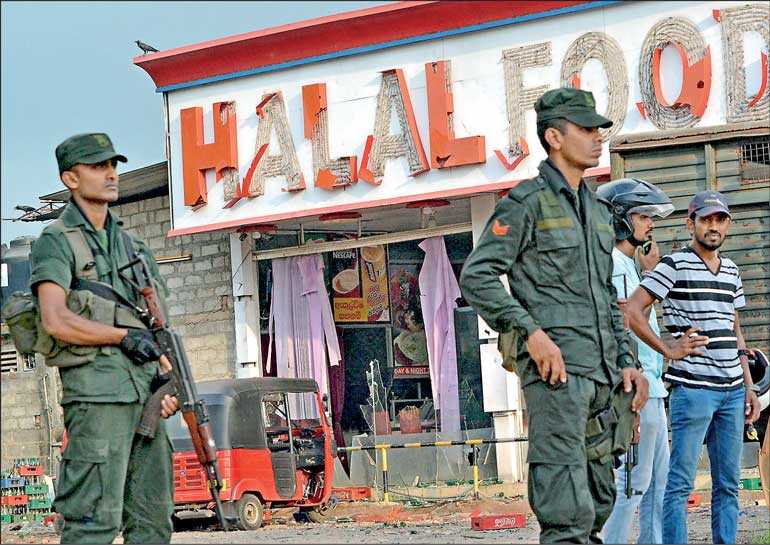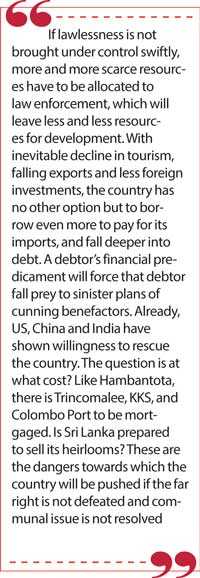Saturday Feb 14, 2026
Saturday Feb 14, 2026
Thursday, 16 May 2019 00:15 - - {{hitsCtrl.values.hits}}

Anti-Muslim violence that started in Negombo in the aftermath of the Easter carnage is now spreading into the north-west, aided,as usual,by some anti-Muslim elements in the police and armed forces. 
In the meantime, President Maithripala Sirisena is far away in China, flown to talk about civilisation while his own country is de-civilising, and a hapless Prime Minister Ranil Wickremesinghe can only appeal to the people to remain calm and visit the ruins left after destruction. The country is virtually without a government for the second time.
The situation is continuation of a history that started in mid-1950s.Since that time communalism has been picked as the only trump card to fight and win parliamentary elections. Sinhala nationalism, Tamil nationalism and Buddhist chauvinism were used very effectively by major parties to win elections.Lately Islamism also has joined the fray. With far right Buddhist elements coming into the scene in a big way, communalism is showing its ugly head once again before the next season of elections, which is around the corner.
Until 2009 every election was fought on the Sinhalese fear of Tamil language, Tamil nationalism and Tamil separatism. Even though the leftists were an exception and shunned this communalism they too had to surrender eventually to communal forces in 1970 before the left disappeared from the scene in 1977.One would have expected JVP to come clean by condemning the Buddhist far right for the anti-Muslim violence currently raging, but its voice too has remained muted except to blame the Government.
After the LTTE was defeated militarily and separatist threat was eliminated,Sinhalese politicians ran out of communal steam to drive an election campaign. When the 2015 elections came there was an expectation in some circles that the chauvinists would commemorate the 100th anniversary of 1915 with another round of Sinhalese-Muslim riots.
Mahinda Rajapaksa thought,however, that his victory over Tamil separatism was sufficient to win the race, but it failed to garner enough votes. After that some tried to rekindle the separatist fear by claiming that LTTE elements are still lurking in the corner. That doesn’t seem to carry much weight because there is no hard evidence.  Therefore there is a need to find a new communal bogey, and that came on a platter with the Easter massacre.
Therefore there is a need to find a new communal bogey, and that came on a platter with the Easter massacre.
It is true that Muslim leadership, both political and religious, failed to detect early enough, and despite several warnings, the dangerous currents that were flowing deep under the muddy waters of a religious awakening since 1990.However, once the Easter mayhem showed clear evidence, they were forthright not only in cooperating with the authorities to eliminate such currents but also to re-think and re-start their religious programs and teachings.
Yet, the far right is not satisfied and wants to take revenge with Muslim blood. According to one Buddhist monk, there is an ‘invisible hand’ directing these marauders with political motive. If the next election is going to be fought on the Muslim issue, and once that issue is also exhausted, who will be the next target to win the following election? Indian Tamils? History repeats in Sri Lanka.
The ultimate victim of this communalism and chauvinism is the economy and there lies the greater danger. It is only five months since the economy started recovering after it was hit by the failed constitutional coup by the President. The bloody Easter and ongoing violence since then have struck another blow to the economy.
If lawlessness is not brought under control swiftly, more and more scarce resources have to be allocated to law enforcement, which will leave less and less resources for development. With inevitable decline intourism, falling exports and less foreign investments, the country has no other option but to borrow even more to pay for its imports, and fall deeper into debt. A debtor’s financial predicament will force that debtor fall prey to sinister plans of cunning benefactors.
Already, US, China and India have shown willingness to rescue the country. The question is at what cost? Like Hambantota, there is Trincomalee, KKS, and Colombo Portto be mortgaged. Is Sri Lanka prepared to sell its heirlooms? These are the dangers towards which the country will be pushed if the far right is not defeated and communal issue is not resolved.
(The writer is attached to the School of Business and Governance, Murdoch University, Western Australia.)